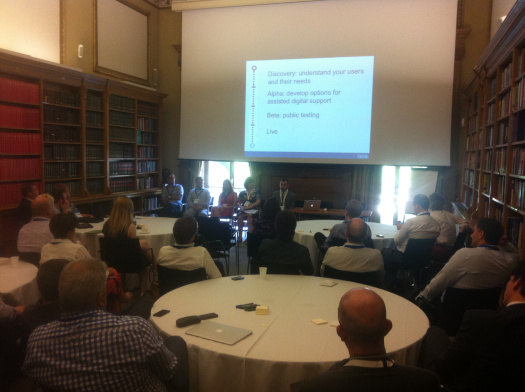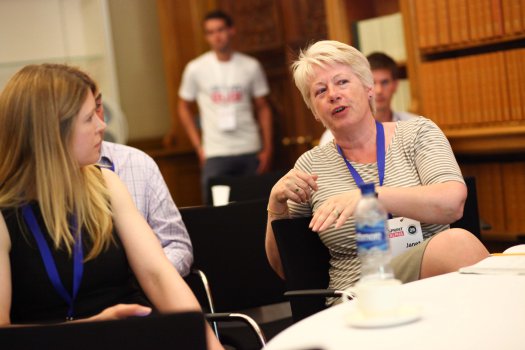‘What about people who aren’t online?’ is a question we’re often asked on the assisted digital team. So we decided to run a workshop at GDS’ Sprint Alpha event on 17th July to answer it.

Rebecca Kemp and Richard Smith kicked off the workshop by outlining the two projects GDS and departments are working on together to ensure that people who aren’t online can use digital government services: assisted digital and digital inclusion.
Digital by default includes people who aren’t online: ‘By digital by default, we mean digital services that are so straightforward and convenient that all those who can use them will choose to do so whilst those who can’t are not excluded.’
Assisted digital
Assisted digital and digital inclusion are both focused on the 18% of UK adults who are offline. Assisted digital is the help that will be provided to these people so that they can use digital government services. As set out in the Government Approach to Assisted Digital, there will be a core set of ways that assisted digital will be provided across services to make sure that people get consistent support and can navigate the places they can get the support from.
All new or redesigned digital services must have assisted digital provision in place to meet the Digital by Default Service Standard. GDS is working with departments, using the assisted digital action plan, to help them meet this requirement for each of the 25 exemplar services. We have also started talking to potential providers of assisted digital support from the commercial, voluntary and wider public sectors.
Digital inclusion
In June, the Government launched the Information Economy Strategy that confirmed a new cross-government digital inclusion team was to be established, sitting in the Government Digital Service. The team, which is headed by Anna-Maren Ashford, will co-ordinate government’s work on digital inclusion for citizens, businesses and charities. It will work closely alongside Martha Lane Fox, Go ON UK and its partners, and will focus on three areas of work:
- developing a strategy for digital inclusion;
- providing leadership by acting as a central point for collaboration with partners to take forward digital inclusion projects, and by working with departments to build digital inclusion into their policy development;
- developing the evidence base on ‘what works’ in digital inclusion, and using this to plan future activity.
Departmental perspectives

After GDS had given an overview of the assisted digital and digital inclusion projects, colleagues from the Department for Work and Pensions (DWP), the Department for Transport (DfT) and the Ministry of Justice (MoJ) talked about the work they’re doing to develop assisted digital support for their exemplar services. This started a discussion with the workshop attendees - people from a range of government departments and agencies interested in how offline users will be able to use digital services - about the shared challenges and insights faced in reaching people who aren’t online.
There were two main themes that emerged from this discussion. The first was the role of customer insight in getting to grips with users. Offline users have different needs when accessing digital services (including lack of access, confidence and ability), which have differing implications for assisted digital provision. Attendees emphasised the need to pull together the common issues users experience across services. The assisted digital team has made a start on looking at user needs across the whole of government through our work with departments, and this is definitely something we want to do more of.
The second theme was exploring the links between assisted digital, digital inclusion and increasing digital take-up of a service. Attendees agreed that it was important to communicate assisted digital support effectively, but also pointed out the need to balance this with incentivising take-up of digital services. We think that an important way to address this is through our work on digital inclusion. We will also explore how we can train people through the use of assisted digital services, and so encourage them to self-serve in future.
It was really interesting to hear perspectives from so many different departments at the Sprint Alpha workshop. The discussion was an important reminder of the connections between the two projects GDS and departments are working on that are focused on people who aren’t online. Although assisted digital and digital inclusion are separate, we know that they are focused on the same users. The teams will be working very closely together to make sure that people who aren’t online aren’t left behind in the move to digital by default services.

4 comments
Comment by What about people who aren’t online? | Rebecca Kemp posted on
[…] super clever colleague Reema Mehta wrote a nice summary of how digital by default Government will meet the needs of users who aren’t […]
Comment by Martin Paul posted on
Interesting piece. Any plans to involve, for example, representatives from the voluntary sector?
Comment by Chris Foreman posted on
As well as involving any other provider of a service in partnership with or contracted by local/central gov. Let's also not forget the end users, after all isn't it their taxes which will fund this all.;)
Comment by What about people who aren’t online? – Government Digital Service | Public Sector Blogs posted on
[…] Original source – Government Digital Service […]